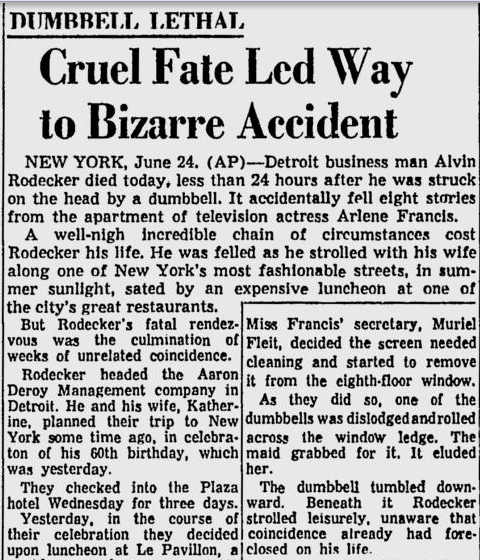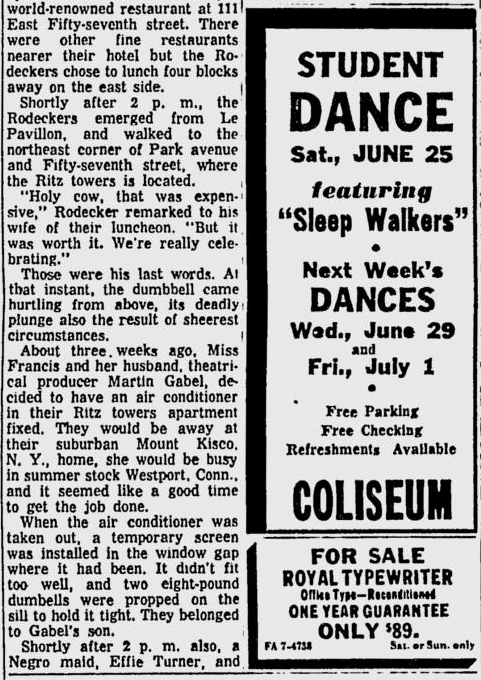1960s
Learn To Ski
Released in 1960, this record promised to teach you how to ski in the comfort of your home.In this record Réal Charette has presumed that the student, whether teenager or adult, has never skied before. He has taken the ski techniques one at a time—kick turn, straight running, snow plow, stem christie, Walden and explained each in turn. He starts with the proper selection of equipment, explained basic and advanced ski techniques and ends with safety hints of value to every skier.


image source: discogs.com
I couldn't find any clips from the record online, but I did find a video from 1953 featuring Réal Charette.
Posted By: Alex - Fri May 28, 2021 -
Comments (3)
Category: Sports, 1960s
Jody Sten, “Smiling Teddy Bear”
Posted By: Paul - Sat May 15, 2021 -
Comments (0)
Category: Fairs, Amusement Parks, and Resorts, Music, Toys, 1960s
Various Commercials 1950s and 1960s
A few observations.
* Nowadays, to our shortened attention spans, sixty seconds feels like WAR AND PEACE.
* Is that the voice of Orson Welles for American gasoline?
* Why is the narration for the Coke stewardess ad a hybrid of THE TWILIGHT ZONE and DRAGNET?
* This was surely the apex of pop surrealism in advertising.
Posted By: Paul - Sun May 09, 2021 -
Comments (7)
Category: Advertising, Surrealism, 1950s, 1960s
“Dumbbell Lethal”


Source: The Spokesman-Review (Spokane, Washington) 25 Jun 1960, Sat Page 19
Posted By: Paul - Fri Apr 30, 2021 -
Comments (3)
Category: Accidents, Death, Hollywood, 1960s
Martian Hop
The Wikipedia page.
Posted By: Paul - Sun Apr 25, 2021 -
Comments (2)
Category: Aliens, Fads, Music, Spaceflight, Astronautics, and Astronomy, Science Fiction, 1960s, Cacophony, Dissonance, White Noise and Other Sonic Assaults
Jazzercise
The Wikipedia page.
Posted By: Paul - Sun Apr 18, 2021 -
Comments (1)
Category: Exercise and Fitness, Fads, Money, Music, 1960s, 1980s
Arnulf Rainer
An experimental film from 1960 about flicker effect. Or, as one commenter on YouTube puts it, "One of the most horrible things ever in the history of the cinema."The film is named after the artist Arnulf Rainer but it's by director Peter Kubelka. Some more info from wikipedia:
Wikipedia also notes that Kubelka refused to digitize the film because "cinema is a completely different medium which cannot be imitated by the digital medium." But it's on YouTube, so someone digitized it.
Posted By: Alex - Fri Apr 16, 2021 -
Comments (1)
Category: Art, Movies, 1960s
The Jiger
My 2 favorite parts of this video: when they launch off a ramp into water; and the vaguely retro-porn-style musical score that someone added.Wikipedia says this was the very first ATV.
Posted By: Paul - Fri Apr 16, 2021 -
Comments (8)
Category: Motor Vehicles, 1960s
B-B-B Sweatshirts
Inexplicable fashion fad: In 1962, San Francisco adman Howard Gossage came up with the idea of putting the faces of classical composers on sweatshirts and selling them for $4. Consumers could choose between Beethoven, Bach, or Brahms. He quickly sold around 60,000 of them.If you want one of these sweatshirts today (at least, an original one), you'll have to pay significantly more. On eBay, the asking price ranges from $1500 all the way up to $9000.


Honolulu Star-Bulletin - May 4, 1962

Oakland Tribune - Feb 8, 1962
Posted By: Alex - Mon Apr 12, 2021 -
Comments (2)
Category: Fads, Fashion, Music, 1960s
Answer Songs
Wikipedia defines an answer song as "a song (usually a recorded track) made in answer to a previous song, normally by another artist." For example, "Yes, I'm Lonesome Tonight" by Dodie Stevens was the answer to Elvis Presley's "Are You Lonesome Tonight?"Frank Hoffmann and William Bailey, in their book Arts and Entertainment Fads, note:
In this case, there was even an answer to Jeanne Black's answer: "I'm Gonna Stay" by Johnny Scoggins.
The Original: "He'll Have To Go" (by Jim Reeves, 1960)
The Answer: "He'll Have To Stay" (by Jeanne Black, 1960)
The answer to the answer: "I'm Gonna Stay" (by Johnny Scoggins, 1960)
Posted By: Alex - Tue Apr 06, 2021 -
Comments (5)
Category: Music, 1960s

| Who We Are |
|---|
| Alex Boese Alex is the creator and curator of the Museum of Hoaxes. He's also the author of various weird, non-fiction, science-themed books such as Elephants on Acid and Psychedelic Apes. Paul Di Filippo Paul has been paid to put weird ideas into fictional form for over thirty years, in his career as a noted science fiction writer. He has recently begun blogging on many curious topics with three fellow writers at The Inferior 4+1. Contact Us |




